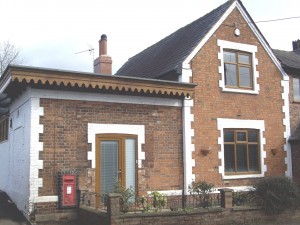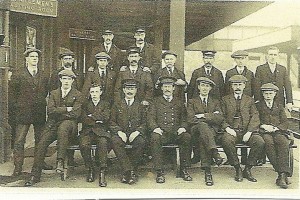After being invited to lunch at the Station House in Wrenbury shortly after John and I had moved into the village, I became interested in finding out more about its history. John is Vice Chair of CASPA and was also keen to know more about the station in Wrenbury, particularly as we live not many yards from it.
I am a keen family historian, and a member of Ancestry. As such I had access to various census records that enabled me to carry out some research. A grandson of Charles who lives in Australia has kindly supplied additional information. I would like to thank him for permission for its use. It is written in good faith. If I have made any mistakes I apologise for this and would be happy to receive corrections.

Charles (Charlie) William Harding was born in 1875 in Willaston. He moved to Wrenbury from Prees when he was five. In the 1881 Census he is living in the Station House with his parents and brother Thomas. His father, John Austin Harding was the Station Master. Charles started to write his life story and kept a record until he was about 16 that contained many childhood memories of his association with the railway. He writes of making up his mind to be a railway man when he watched the trains shunting from the windows at Wrenbury School. Mentioned also are the great preparations in 1891-1892 for the arrival of the Empress of Austria and her entourage en route to Combermere Abbey for the hunting season. New platforms and waiting rooms were built, and a train was kept in readiness with a Royal Saloon attached to take her to the hunt. Although guarded by detectives Charles excitedly remembers sneaking through the office to the platform and lifting his cap to the Empress. In return receiving a little bow from her. Charles writes of the four special trains that would sometimes arrive bringing horses and hounds from Shrewsbury, Chester, Hartford and Wilmslow, and makes the interesting social commentary on the poverty at the time when farm workers earned 14 shillings and railway porter15 shillings. All telegrams would come over the railway wires to the station in those early days and it was left to Charles to deliver the messages to the nobility and landowners in the area. As a consequence Charles says he always had plenty of pocket money. He used to spend a great deal of time at night doing odd jobs in the station office and would often go out with an hand lamp and label 3 or 4 truck of potatoes that were grown in Wrenbury and sent to South Wales. One night while Charles was about his duties he found that milk churns and sleepers had been thrown on the lines. Dashing back he alerted his father so that he could stop the trains, thus averting a possible accident. Platelayers were dispatched and detained a man who was later tried at Chester Assizes. Charles was the chief witness and was rewarded with the huge sum of 2 guineas. It seems that Wrenbury was a hive of activity during the potatoes season. Charles notes that many Irish people would arrive to dig the potatoes up. They would work all week, sleeping in the barns on bales of straw, but at weekends would go into Nantwich and get the last train back fighting drunk, to be awaited by the police that John Harding had called.
Charles father was Station Master at Wrenbury before him for many years. His father’s influence and his love of trains continued into his early adult years. Aged fifteen and a half he was sent to Shrewsbury to sit his exams as a junior clerk and was appointed after giving as character references Lord Combermere, Squire Poole and Reverend Norwood. By 1891 when he is 16 he is employed as a Railway Clerk on the census of Wrenbury.
Charles’s diary entries end by the time he is 16 due to illness and much is lost of his wonderfully descriptive commentary. Through historical records we know that in 1901 the census return shows Charles aged 25 staying with his Grandfather in Wem and he is still a railway clerk. His father John Harding is a Railways Brakeman on the 1901 Census living in the St Julian Civil Parish of Shrewsbury with his wife and his son Thomas who was also a Railway Clerk. John dies in 1906. Interestingly all the men listed on this page of the census are employed in some capacity by the Railway.
By 1911 Charles is himself Station Master at Wrenbury Station employed by the London and North West Railway. The household comprises of Charles, now 35 years of age, his wife and their three children. Living with them is 58-year-old Mary Harding, his widowed mother.
 The group photograph shows Charles William as Station Master with other railway employees on the platform at Nantwich Station. Although undated, I am informed that it is likely to be around 1915. Charles looks very professional and distinguished in his uniform sitting centre of the front row. Perhaps readers will recognise some of their ancestors from this photograph.
The group photograph shows Charles William as Station Master with other railway employees on the platform at Nantwich Station. Although undated, I am informed that it is likely to be around 1915. Charles looks very professional and distinguished in his uniform sitting centre of the front row. Perhaps readers will recognise some of their ancestors from this photograph.
Charles’s grandson informs me that he commenced employment at Wrenbury on the 19th September 1907 on £95 per year, finishing in 1913 when he became Station Master at Nantwich earning £130 pa. He wasn’t an ordinary Station Master according to Charles’s grandson who refers to his ‘1st class’ credentials having turned down appointments at one of the London stations.
The family moved out of Wrenbury Station House on the 10th February 1914. Another child was born to Charles and his wife Alice Ellen in 1912, and like Charles kept a diary until her death. His grandson has informed me this contained many useful snippets of information for the family. This included reference to Charles winning a railway garden competition in 1913 after planting roses on the platform of Wrenbury Station. She notes also the last milk train at Wrenbury on the 28th September 1913. Charles was also at Prees Station during WW1 when the area was used as an assembly camp.
I have no other information regarding Charles’s occupational life with the railways after the period that the photograph was taken and up to death, regarding his employment or association with the railways. What is known through his childhood diary and from family memories and jottings is that he was a very interesting man who served his profession with pride. He made a big achievement from that boy peering through the classroom window to the lofty heights of Station Master. He and his forbears have made interesting research and both John and myself have found out so much about the history of Wrenbury Station.
If anybody has any additional information about the Harding’s employment with the railways or any interesting news about other stations along the line please contact John Coulter jrcoulter@hotmail.co.uk or 01270 781295.
Maureen Coulter

